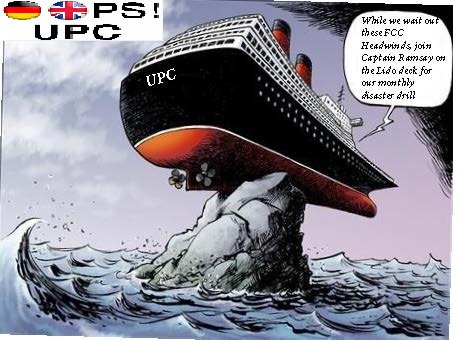

THE EPO races to the bottom. The management quit giving a damn about the EPO's reputation and it is now lying so routinely that staff is left embarrassed (or staff's intelligence insulted). There are many sectors where lying to staff is easy and management can get away with it. But not patent examiners (scientists). They are hard to mislead and they don't like being managed by people far less intelligent than them -- people who get their job owing to nepotism and submissiveness to authority. Intelligence is no longer being rewarded at the EPO; instead, it's blind loyalty and lack of scrutiny of patent applications (for the sake of 'production'). It's alarming because it means that the EPO won't be able to attract -- and at the same time lose -- its most valuable asset, which is smart people. This is how organisations prosper and perish; it's all about who they're able to recruit.
Join me on Thursday 1/18 at 12pm ET for a free webinar on the #UnitaryPatent. Will have a guest from @EPOorg and a European Patent Attorney. Register at http://bit.ly/2CWKtwr . Sponsored by @MorningsideIP pic.twitter.com/VYnpTLHPiY
Advocacy coalition, IP2Innovate, whose members include Google, Spotify and Intel, claimed that trolls already make up a “staggering 20 percent of all patent lawsuits in Germany”.
Patrick Oliver, executive director of IP2Innovate, said that the UPC was a cause for concern and could prove an “attractive venue for patent abuses”.
A spokesperson for the coalition added that “the threat of an EU-wide injunction is a powerful weapon, and the UPC hands PAEs exactly such a weapon.”
It's been drawn to my attention (via comments on Kluwer and correspondence on Twitter) that the DAV is not the official German Bar Association, but instead is a voluntary association. The German Federal Bar Association (of which membership is compulsory) is the Bundesrechtsanwaltskammer (BRAK). This, too, was invited to file observations, but as yet they have not been made public, if such observations were indeed submitted.
An important thing to bear in mind here is that the decision on admissibility ultimately falls to the German Federal Constitutional Court. Thus, while the DAV opinion certainly provides one set of arguments in favour of inadmissibility, this is not a foregone conclusion. Many other organisations have also been invited to comment, but most German practitioners I've spoken to expect those organisations to take more or less the same line as the DAV.
My understanding is that the Federal Constitutional Court now has a range of options ranging from a straightforward written finding of inadmissibility at one end, all the way through to - at the other end of the scale - an oral hearing at which both the admissibility and the substance of the complaint are argued in detail. We will probably not know which option the Court will go for until it makes an announcement informing us. This could depend on how persuasive the judges find the arguments for admissibility/inadmissibility from either side.
The lack of transparency in this procedure overall is really quite striking. (If anyone can confirm that this is a general feature of German legal proceedings, do let me know!) The DAV is, in my opinion, to be commended for publicising its position even though many readers of this blog and others may well be in disagreement with the idea of the UPC.
The DAV's comments should not be taken at face value. The most recent comments on another Kluwer post illustrate why the DAV's submissions "amount to nothing more that smoke and mirrors, together with desperate attempts to gloss over gaping holes in the legal arguments":
http://patentblog.kluweriplaw.com/2017/12/12/prof-tilmann-fcc-several-reasons-reject-inadmissible-complaint-upca/
Whilst the EPO might be an international organisation that is afforded various privileges and immunities, this does not mean that it can operate without any thought to the constraints imposed by EU law. For example, the EPO's assessment of patentability must respect the provisions of the Biotech Directive. If this does not happen, then there could be serious consequences for the EU Member States. The failure of the DAV's submissions to acknowledge such complexities therefore provides yet another reason to take their views with a pinch of salt.
German ratification is dependent on the outcome of the challenge being mounted in the German Federal Constitutional Court (FCC) regarding the constitutionality of the law passed by German Parliament on the UPC’s implementation. The German court has asked for observations on the case and had previously set a deadline for any comment by end of October 2017 – though it has been reported that this has now been extended to the end of the year. The FCC will then determine whether or not to dismiss the complaint, a process which is expected to take until at least April 2018. If the complaint is dismissed, Germany will be able to ratify the UPCA soon after. There has, however, been talk of the possibility of the case being referred to the Court of Justice of the EU (CJEU), which would cause substantial delay to the case being decided and ultimately to Germany’s ratification.